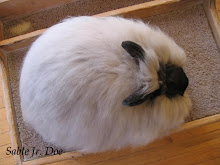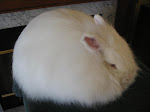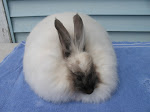
In keeping with the kindling/litter/pregnancy/breeding season subjects of the past week, I thought I would post another entry on the care of pregnant does. This one has to do with herbs that are beneficial during pregnancy, post-birth, and weaning, and since many of us have 'bunny borders' in our gardens at this time of year, it seems like a good topic to address.
Spring is the optimal time for getting does bred and kindling successful litters, and most everyone in the barn is ready for babies and doing what comes naturally as a result.
Since we have such a huge garden and a large variety of herbs at our fingertips, I have been using them more and more heavily during the breeding season, particularly for pregnant and nursing does.
Spring is the optimal time for getting does bred and kindling successful litters, and most everyone in the barn is ready for babies and doing what comes naturally as a result.
Since we have such a huge garden and a large variety of herbs at our fingertips, I have been using them more and more heavily during the breeding season, particularly for pregnant and nursing does.
There are lots of plants and herbs out there that benefit rabbits, but some are especially excellent for pregnant and lactating does. There are a few vitamins/minerals that are important for does and developing litters DURING pregnancy, some that are helpful AFTER kindling, and some that work to dry up a doe once the litter is weaned.
Before pregnancy, always make sure that the doe is in good condition. She cannot be woolblocked, experiencing health problems, or physically compromised in any way. She should not be fat or routinely overfed either, because overweight does build fat deposits around the reproductive organs that can hinder conception and litter growth. A vitamin that is critical at this time is Vitamin A, particularly since levels of this nutrient tend to fall off during the winter in pelleted feed and leave a doe deficient when it comes time for spring breeding. The PRIME source of Vitamin A in herbs/plants is unquestionably Dandelions, which contain 14,000IU of the vitamin in every 100 grams. Another good source is Comfrey.
Dandelions are easy to find and EXTREMELY palatable to most bunnies. I usually give 4-5 leaves to pregnant does every other day during gestation, and 2-4 leaves to every other rabbit at the same time (just for the other benefits it provides). Comfrey should be given more sparingly since studies have indicated the presence of carcinogenic properties in the leaves when they make up 33% of the diet, but it is still a beneficial plant as long as you feed it less often (about 1X a week) and rip it up finely so that it doesn't stick to the rabbits' wool.
The second most excellent herb to give pregnant does is probably Parsley. The wonderful thing about Parsley is that it is an appetite stimulant, it is good for woolblock, AND it is an excellent source of calcium which pregnant and nursing does need and can experience severe to fatal health problems without. I give 2-4 sprigs of Parsley to my does every other day as well:).
Another supplement to mention which is NOT an herb but is nonetheless helpful to gestating moms is an Electrolyte solution. AcidPak is an excellent product for this purpose (available at Klubertanz and other cage or livestock companies), and can be added to the water to keep systems balanced under the strain of kindling and nursing. I give 1/4 tsp. per gallon to does for 3-4 days before kindling and 3-4 days after. I continue to supply it every other day afterward, particularly in hot weather.
Directly after kindling the regimen changes and every doe who has just had a litter is given 4-5 leaves of raspberry, blackberry, or strawberry as a tonic for the reproductive tract and to soothe inflammation. Dandelions are eliminated from the diet entirely at this point because they boost milk supply and feed/supplements must be restricted the first few days to prevent too much milk from being forced in too early. Since dandelion stimulates milk production it may be helpful to does who are NOT good nursers and need extra help 3-4 days after kindling, but a good milker will need all stimulants eliminated completely until at least the 10th day when kits are beyond the danger of being overfed and the supply begins to dramatically increase. If a litter is large (7 or more kits) I begin adding it again around the 2nd week and certainly during the 3rd week when milk production is at it's highest and the doe needs all the help she can get in the heat of summer:).
Other herbs that stimulate milk production are Borage (both the leaves and flowers) and Fennel.
Once a litter is weaned it is time to dry up the doe and get her system back to normal. Some does wean babies naturally around the 5th or 6th week, but to be honest (more often than not), I have seen litters still nursing at 7-8 weeks, so do not assume that a doe is dried up and needs no special care because the babies are older.
Mint and Sage are excellent herbs for slowing down milk production, and can be given every day as soon as the last 2 babies are weaned. In addition to these, I take pellets away completely for 2 days and feed water and hay only, then slowly build the ration back up to pre-pregnancy levels. It is important to check the bellies of lactating does frequently to make sure that the milk is indeed drying up. If the stomach/chest is flat then the doe is fine and ready to go back to a normal feed ration. If you still feel puffiness/ lumpiness underneath keep the pellet level low and continue to feed herbs. Sometimes a doe who is a heavy milker will take longer than average to dry up----a doe I owned named Chartres routinely took 7 days to go all the way back to normal after weaning 8 week old litters, so be sure to check undersides every day:).
Well, that's it for today. We are winding down here after a hectic week with lots of active children running around (8 of whom are boys, LOL!), and now I will be looking forward to getting life back to normal and kicking off a fun and productive summer vacation. More again next time!:^)























1 comment:
There are many other herbs for pregnancy that one can try, though certain precautions must be observed. Just be careful. Have a great day!
Jayshree xxxx
jayshree.snydle.com
Post a Comment